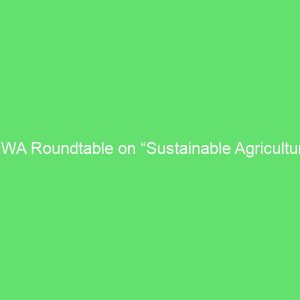Monday 22nd May, 2017 : The African Development Bank invited SEWA to host the Roundtable to discuss the nexus between Energy, Agriculture, Work and Women at it’s Annual meeting at Mahatma Mandir, Gandhinagar. The focus was on how Renewable Energy enables water for irrigation, especially for small farmers, increasing their yields and production, thus enabling the small farmers to break the cycle of debt and poverty. Further, since the women were at the centre of the successful implementation by SEWA, the ownership of other asset and the generation of the income in her name, strengthened her voice and her standing in their families and communities.
The Principal Secretary (Agriculture, Government of Gujarat) – Mr Sanjay Prasad IAS , the Vice president (Agriculture, AfDB) – Ms. Jennifer Blanke, H.E. Minister of Agriculture, Ghana – Mr. Osu, Country Director (International Finance Corporation) – Mr Jun Zhang, the Policy Adviser (Womens Economic Empowerment, UN Women) – Dr Asa Torkelsson, the Managing Director (Gujarat Agro Industries Corporation) – Mr KS Randhawa IFS and the Financial Institution Specialist (Green Climate Fund) – Mr Leo H. Park were among the dignitaries who participated in the roundtable, exchanging their views on the topic which is deeply relevant for both continents.
Ms. Blanke described the meeting as very inspirational and was happy with the women’s work in field of agriculture and would like to apply these learnings from SEWA in Govt policies for developing agriculture in Africa.
Mr. Zhang appreciated the work SEWA has been doing for salt-pan workers and shared his extensive experience of working with SEWA, in building the macro economic model that is sustainable and scalable. He urged to scale up this successful model of converting debt into assets, as it will help eliminate poverty.
Mr. Prasad acknowledged the role of women in agriculture and their challenges in energy access and informed about various Govt. schemes and subsidies focusing on uplifting the livelihoods of small and marginal women farmers.
Mr. Randhawa described Gujarat as a policy-driven state having various farmer friendly policies and invited Africa to sign MoU’s for investment in agricultural sector in Africa by Gujarati farmers as well as food processing.
Mr. Osu appreciated the work SEWA does in the field of organising and micro-finance and said that “We are looking to assess the areas of credit-finance and organising co-operatives to enhance the involvement of women in trading and production.”
Reema Nanavaty, Director of SEWA said, “SEWA – Africa relation is on equal footing with both having so much to learn from each other. I propose a SEWA-Africa Women Economic Partnership which can focus on 3 areas – women’s access to ownership of ecosystems based agriculture, women’s ownership of renewable energy products, and women’s access to capital to strengthen livelihoods.”
Kapilaben, President of SEWA, and a small farmer herself said, “I have been associated with SEWA for 2 decades. Through SEWA’s various capacity building initiatives, I have learned how to do better in agriculture and thereby increase my income. I do lily farming and have to harvest lilies early in the morning before dawn. Without lights in the farms, it was very difficult. In 2013, through SEWA’s Hariyali initiative, I purchased solar light on loan. Using this solar lantern, I can start working in the fields before dawn, harvest my lilies and make them reach market before 7:00 AM. This has almost doubled my income. I would like my other SEWA sisters also to reap the benefits of solar lantern and so I propagate and sell the solar lantern in my neighbouring villages. My other SEWA sister’s get benefit out these and I can earn extra income as commission. I am grateful to SEWA for improving my livelihood and thus my family’s life.”

Comments are closed